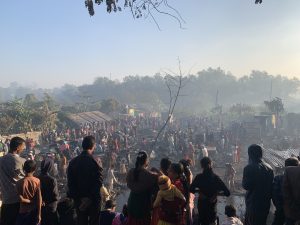Fire incidents in the Rohingya refugee camps in Bangladesh have become a frequent and devastating occurrence, causing immense suffering among the already vulnerable population. The overcrowded and makeshift nature of the camps, where families live in shelters made of highly flammable materials, exacerbates the danger. Fires can spread rapidly, destroying homes and belongings within minutes, leaving refugees with nothing.
These fires are often triggered by cooking accidents, the use of unsafe heating sources, or unexpected incidents, adding to the fear and insecurity in the camps. Without proper firefighting equipment and a swift response system, these fires often spiral out of control, causing widespread destruction and loss of life.
A recent fire incident in Rohingya Camp 26 highlighted the devastating impact of these frequent blazes. The fire, which occurred at around 11 p.m. on January 16, destroyed numerous shelters, displacing more than 65 families. The flames spread uncontrollably, leaving behind a trail of destruction that affected homes, possessions, and the emotional well-being of those living in the camp.
Tragically, a five-year-old girl named Ayesha lost her life in the blaze, and many others sustained injuries. This heartbreaking incident left many refugees in an even more precarious situation, particularly with the winter season bringing additional challenges.
The January 17 tragedy came less than a month after a fire in Rohingya Camp 1 West on December 24 killed two people and left 4,000 homeless.
In response to the growing number of fire-related tragedies, urgent measures are needed to prevent further loss of life and property. These include enhancing fire safety awareness among refugees, providing proper firefighting equipment and training, and improving the overall infrastructure of the camps to reduce the risk of fires. Humanitarian organizations have been quick to provide emergency relief, offering medical aid, food, and shelter, but sustainable solutions are essential to prevent the recurrence of such tragedies and to protect the lives of the refugees.













































